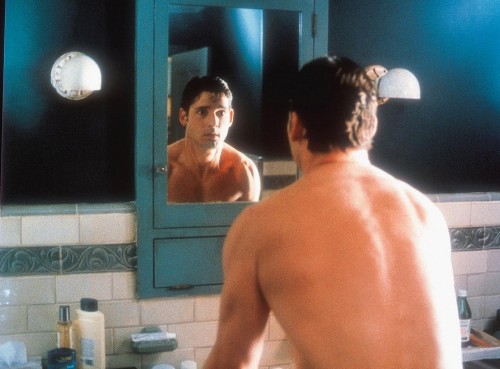Don’t Blog
Don’t Write a Novel
A torrent search for “wikipedia” that returns nothing & everything
At some point in your life, you should probably chop off all your hair.
Twitter is the very best or worst thing that has ever happened to literature.
Blog comments as a close second, Facebook a far flung turd.
I stared at an abandoned, waterlogged, pink stuffed animal splayed ass-up on a rail for months, smoking cigarettes, trying to figure what it said.
For a couple of days a matching, stringless acoustic guitar stood watch over it.
What happens to music that isn’t recorded, or played. Is it?
Everybody Loves Bacon

“I think of myself as a kind of pulverising machine into which everything I look at and feel is fed.”
The Writer as Performer
THE BELIEVER: When you were a little girl you wanted to be an actress, not a writer?
JOAN DIDION: Right.
BLVR: But you said it’s okay, because writing is in some ways a performance. When you’re writing, are you performing a character?
JD: You’re not even a character. You’re doing a performance. Somehow writing has always seemed to me to have an element of performance.
Bill Knott on poetry and failure
Masochists, manic depressives, suicides, all poets are neurotics of the death instinct, losers and failures who embrace the misery of their wretched trade, who wallow in its servile aura of diminishment and squalor—its paltry practice.
But among poets, those dismal defeated schlemiels and corner-biting cowards lured by vile Virgils into the abyss of verse, a fortunate few manage to inhabit the upper circles, its higher hellblocks—
Even among the damned there are divisions…there are even (and it’s almost unbelievable that they can exist) some poets who want to succeed! Who want their poetry to be read! Who actually try to write poetry that is accessible and can reach an audience!—
What traitors these are to their class—(jeez, if they didn’t want to be failures, why did they become poets!)
(Source)
God is a collective action problem
I read maybe a weird amount about finance and economics. I’m not entirely sure why: it’s not as if I have the means, educational or otherwise, to evaluate the truth of what I’m reading. Felix Salmon is one of my favorite writers in this area. He and others have been talking up this post by Steve Waldman as uniquely informative and thought-provoking. I read it and I felt that this was fair, and then I started thinking (as I will so-painfully-predictably do) about its applications to writing. You should read the whole thing, but I’ve put together a short version (with most of the assertions and very little of the evidence-by-example, the gold standard of persuasion!).
I’ll summarize in advance: finance in general, and banks in particular, are hopelessly complex and opaque, but this is basically a good thing. It allows us to trick ourselves into investing despite our naturally risk-averse nature by hiding the risk inherent to investment. Economic development requires us to solve a classic collective action problem: nobody wants to be the first to invest, but we need broad investment and many failed enterprises in order to generate returns–and benefits in terms of human welfare. Banks help us to move past this problem by lying to us (though they themselves believe the fiction). They can’t eliminate risk, but they can and do hide it. This opacity allows them to commit fraud and other shady activities, but it’s probably necessary to develop something like modern civilization. My edited-down version of Waldman’s argument, and some attempts to link this to writing and reading, are after the fold: READ MORE >
Was our need to be understood more important than a living wage?
“Amazon’s success didn’t just come from predatory buying and selling practices. Nor did it come from of simple ingenuity. It was a combination of these elements and deals struck by one generation with itself regarding personal identity, worker’s rights, and the value of stock speculation. Was the right to have green hair and torn t-shirts worth it? Was our need to be understood more important than a living wage? Were these even the choices we faced? . . . Bezos once bragged in a Wall Street Journal interview that he told temp agencies to hire the “freaks.” The assumption at the time was that Bezos wanted creativity. But his creative staff wasn’t coming out of the temp agencies, the warehouse recruits were. And I never met a “freak” who wouldn’t throw over a decent wage to work somewhere lousy if they felt they belonged. These were people who wanted to be a part of something. They wanted to be valued for who they were, rather than what they produced. I often wondered if what Bezos really figured out was that if you gave freaks a home, they would give you everything they had-their best ideas, their longest days, and their rights on the job.” — Vanessa Veselka, on attempting to unionize Amazon
man reading digital New Yorker on hanukkah day 2 has 22 thoughts
1. Is it worth the money?
2. I feel guilty if I’m not reading at least three times a week because of all the money. Very tough to read everything you need to read. It’s depressing, like Christopher Hitchens dying or Schopenhauer or some of the things he said.
3. Schopenhauer:
Buying books would be a good thing if one could also buy the time to read them in: but as a rule the purchase of books is mistaken for the appropriation of their contents.
4. The digital New Yorker keeps writing about Christopher Hitchens out of respect but you can tell the writing is a little guarded, still bitter about Hitchens Left-2-Right turn and his steadfast support for the War in Iraq.
5. Shouldn’t I be adding links? If you are going to talk about something digital, please add links, you miserable cur.
6. Will Blake Butler do one of those “Look at all these fucking books I read” list this year? That list always makes me angry and unsure of myself. Then I think, “Well shit, he has insomnia, maybe he’s reading a lot at night?”
7. I’m surprised no one has talked about James Franco yet. He hires his professors into Hollywood jobs. He maybe got a professor fired because of a D grade? I don’t know.
8. If you have any fucking sense, you’ll want to read Christopher Hitchens on James Joyce.
A century later, the literary world will celebrate the hundredth “Bloomsday,” in honor of the very first time the great James Joyce received a handjob from a woman who was not a prostitute.




